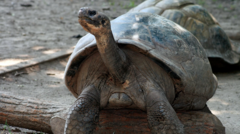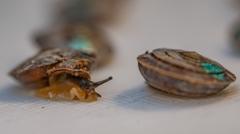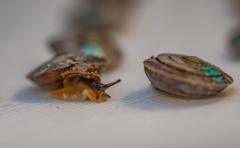**Philadelphia Zoo announces the joyful arrival of four Western Santa Cruz Galapagos tortoise hatchlings, a first in its history, showcasing a strong conservation effort for this endangered species.**
**Giant Tortoises at Philadelphia Zoo Celebrate Historic Hatchlings**

**Giant Tortoises at Philadelphia Zoo Celebrate Historic Hatchlings**
**Groundbreaking Births Mark a Milestone for Critically Endangered Species**
In a remarkable turn of events, two Western Santa Cruz Galapagos tortoises, both close to a century old, have become proud first-time parents at the Philadelphia Zoo. The zoo recently celebrated the hatching of four healthy offspring from the pair, named Abrazzo and Mommy, marking a historic moment in the institution's 150-year legacy. Mommy, who has resided at the zoo since 1932, is now recognized as the oldest first-time mother of her species.
With fewer than 50 Western Santa Cruz Galapagos tortoises in captivity across U.S. zoos, this birth is a crucial advancement for their conservation. The first egg from this special duo hatched on February 27, with the remaining three following closely behind. The zoo's devoted animal care team is attentively monitoring several additional eggs that could hatch soon. Each of the hatchlings weighs between 70 and 80 grams and is currently being nurtured in a secured area within the Reptile and Amphibian House.
The public eagerly anticipates the debut of the little tortoises on April 23, coinciding with the 93rd anniversary of Mommy’s arrival at the zoo. This occasion will not only celebrate the hatchlings but will also highlight the zoo’s commitment to the Association of Zoos and Aquariums' breeding program, which focuses on maintaining genetic diversity and ensuring the survival of endangered species.
Jo-Elle Mogerman, the zoo's president and CEO, expressed her excitement about this historic achievement: "This is a significant milestone in the history of Philadelphia Zoo, and we couldn't be more thrilled to share this news with our city, region, and the world.” She added that anyone who has visited the zoo over the past 92 years has likely encountered Mommy, who has become an iconic figure at the institution.
Abrazzo, the father tortoise, joined the zoo recently in 2020 after relocating from Riverbanks Zoo and Garden in South Carolina. The Philadelphia Zoo is hopeful that these hatchlings will contribute to a sustainable population of Galapagos tortoises for generations to come, as they strive for a healthy planet 100 years into the future.
With fewer than 50 Western Santa Cruz Galapagos tortoises in captivity across U.S. zoos, this birth is a crucial advancement for their conservation. The first egg from this special duo hatched on February 27, with the remaining three following closely behind. The zoo's devoted animal care team is attentively monitoring several additional eggs that could hatch soon. Each of the hatchlings weighs between 70 and 80 grams and is currently being nurtured in a secured area within the Reptile and Amphibian House.
The public eagerly anticipates the debut of the little tortoises on April 23, coinciding with the 93rd anniversary of Mommy’s arrival at the zoo. This occasion will not only celebrate the hatchlings but will also highlight the zoo’s commitment to the Association of Zoos and Aquariums' breeding program, which focuses on maintaining genetic diversity and ensuring the survival of endangered species.
Jo-Elle Mogerman, the zoo's president and CEO, expressed her excitement about this historic achievement: "This is a significant milestone in the history of Philadelphia Zoo, and we couldn't be more thrilled to share this news with our city, region, and the world.” She added that anyone who has visited the zoo over the past 92 years has likely encountered Mommy, who has become an iconic figure at the institution.
Abrazzo, the father tortoise, joined the zoo recently in 2020 after relocating from Riverbanks Zoo and Garden in South Carolina. The Philadelphia Zoo is hopeful that these hatchlings will contribute to a sustainable population of Galapagos tortoises for generations to come, as they strive for a healthy planet 100 years into the future.






